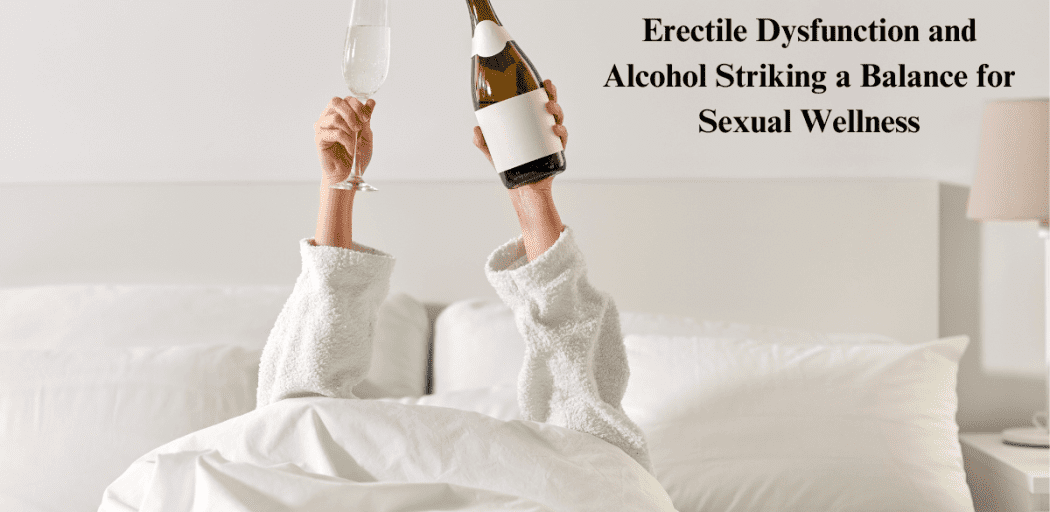If you truly desire a life of purpose and fulfillment, prioritizing your health and well-being is essential. Alcohol use, which has been associated with dysfunction (ED) in males, is one risk that may impair our performance. For centuries alcohol has been closely connected with events, festivities, and opportunities to unwind.
When consumed responsibly, it offers a respite from life’s pressures, enabling people to relax and loosen up. In this blog post, we will delve into the connection between dysfunction and alcohol, examine how alcohol can affect function, and provide insights on how individuals can find a healthy balance to preserve their sexual well-being.
Psychological or behavioral variables might influence the development of dysfunction. It is important to grasp the mechanisms underlying ED concerning alcohol consumption. Physiologically alcohol impacts the body by diminishing the brain’s ability to transmit information to the regions associated with pleasure. Additionally, it can result in an increased release of hormones, which is linked to decreased desire and function.
The Impact of Alcohol on Sexual Performance:
While alcohol is often linked to feeling more self-assured and less inhibited, it can impact performance. Many men mistakenly believe alcohol can improve their experiences by reducing anxiety and boosting their sex drive. However, the truth is that excessive alcohol consumption can cause problems that harm function;
Erectile Dysfunction
Alcohol in the system can affect a person’s ability to get and maintain an erection, commonly known as dysfunction. This happens because alcohol reduces blood flow to the penis, which’s crucial for achieving and sustaining an erection.
Decreased Sensation
Drinking alcohol can dull one’s senses, leading to decreased sensitivity during activity. This might make it harder to reach orgasm or result in reduced pleasure.
Delayed Ejaculation
For some men, alcohol consumption can cause delayed ejaculation. Even make it impossible to reach orgasm altogether.
Lower Testosterone Levels
Alcohol use can reduce testosterone production, an important hormone in sustaining sexual desire and performance.
The Alcohol and Erectile Dysfunction Connection:
Although alcohol is classified as a depressant, consuming it in Moderation can help people unwind and lower their inhibitions, potentially increasing sexual desire in certain situations. However, consuming alcohol can lead to various psychological effects impacting sexual performance.
Blood Flow
Since alcohol widens the blood vessels, it hampers the ability to achieve or maintain an erection by reducing blood circulation to the penis.
Impaired Nervous System
Alcohol’s depressive effects on the system can interfere with the brain’s ability to transmit signals for sexual arousal and response.
Hormonal Disruption
Heavy drinking can disrupt the balance in the body affecting testosterone levels and contributing further to erectile dysfunction.
Anxiety about Performance
Over time, individuals may develop anxiety about experiencing dysfunction due to alcohol consumption. This anxiety can worsen the problem creating a cycle.
Self-Esteem and Confidence
Alcohol-induced erectile dysfunction can impact a man’s self-esteem and confidence. It can trigger feelings of inadequacy and shame, resulting in a reluctance to engage in moments and further deterioration of well-being.
Relationship Strain
Struggles in a Relationship; dysfunction (ED) can cause tension and strain in partnerships. When alcohol consumption plays a role, it can leave partners feeling disconnected and frustrated, which can lead to emotional distance between them.
It’s important to note that while moderate alcohol consumption may affect relaxation and inhibitions related to sexuality, excessive drinking should be avoided due to its impact on sexual performance.
Finding a Balance for Sexual Wellness
While it may not be necessary to avoid alcohol completely, it is important to balance alcohol consumption and maintain well-being. Here are some strategies to help you strike that balance.
Understand Your Limits
It’s crucial to know how your body responds to alcohol. Each person has thresholds, so recognizing when you’ve reached your limit and avoiding drinking is essential.
Embrace Moderation
Indulging in drinking sessions aims for Moderation when consuming alcohol. Stick to recommended guidelines, such as limiting yourself to one drink per day if you’re a man, to minimize the risk of experiencing dysfunction (ED).
Stay Hydrated
Drinking plenty of water between beverages can help counteract the dehydrating effects of alcohol and reduce its impact on function.
Open Communication with Your Partner
If you’re facing issues with ED, honest conversations with your partner about it are important. This can help alleviate anxiety and create an environment of support.
Seek Professional Assistance
If ED persists or becomes a recurring problem seeking help from healthcare providers or specialists in health is crucial. They can help identify causes. Provide appropriate treatments.
Adopting a Healthy Lifestyle
Regular physical activity, maintaining a balanced diet, and getting rest can greatly enhance sexual well-being and lower the chances of experiencing erectile dysfunction.
Explore Options
When spending time with others it’s worth considering activities that don’t revolve around alcohol. This could include participating in sports enjoying movie nights, or attending events.
Conclusion
Alcohol consumption can have an impact on dysfunction as factors influence it. At the same time, moderate drinking has advantages; excessive alcohol use can contribute to dysfunction and other health issues. It’s crucial to balance alcohol intake and sexual well-being to ensure life.
By being aware of limits having communication, and adopting a healthy lifestyle, men can reduce the risks associated with erectile dysfunction and improve their overall sexual well-being. When necessary, seeking help and advice is key in addressing and managing erectile dysfunction.
Prioritizing one’s health and well-being is crucial for establishing a relationship with oneself and one’s partner. Striving for a balance between indulgence and self-care can ultimately lead to a healthier life for everyone involved.

